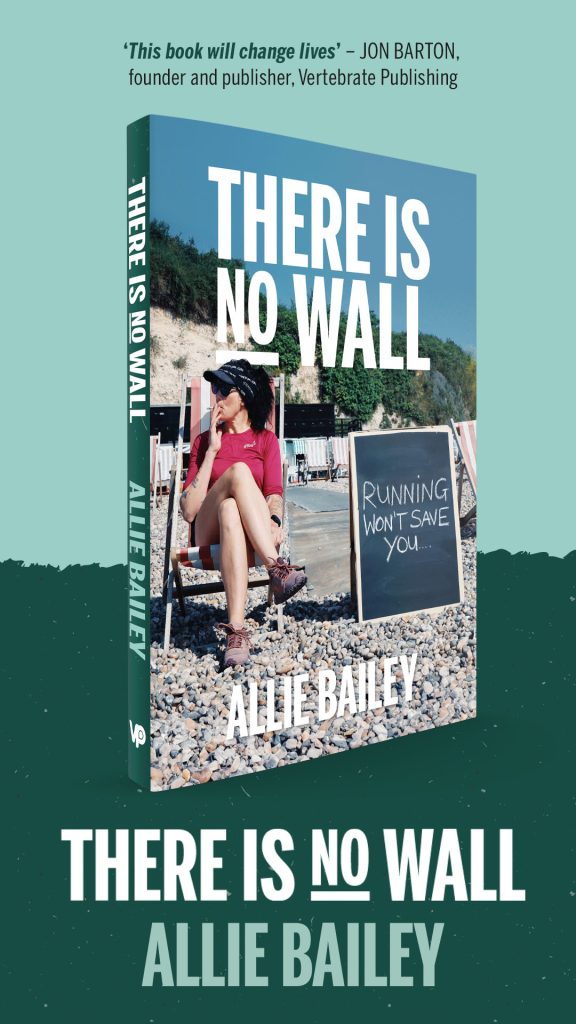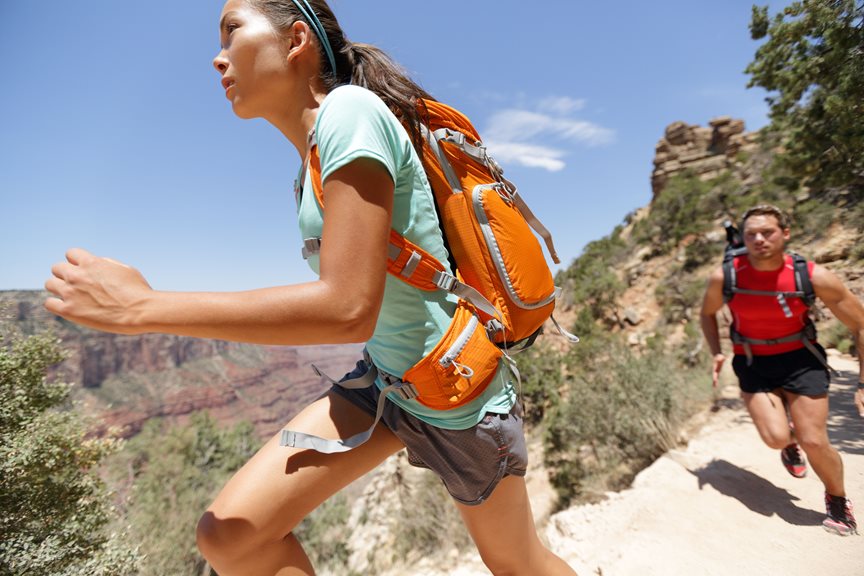There is No Wall
I first came across Allie a few years ago when Susie Chan interviewed her for RunUltra. Allie was a “test pilot” for Rat Race Events and I remember thinking that must possibly be one of the best jobs in the world.
Since then, having followed her on Instagram, I’ve been aware of her struggle with depression, and the subsequent positive changes in her life. I was really interested to be asked to interview Allie and I was sent an advance copy of “There is No Wall” to read ahead of the interview.
Allie writes about her alcoholism and depression in and around her amazing running adventures. She shares deeply personal stories and viewpoints that must have been very difficult to face, let alone write about and share publicly.
The book starts with Allie’s work in the music industry, and then goes on to describe how she started running. I won’t write any spoilers here, do not fear! But my fascination with Allie is how she was able to run all the extreme events she describes, whilst being physically limited by alcohol and mentally ravaged by depression.
So, my first question was how she ran those events in the condition she did when many people struggle to complete in the best of physical and mental health?
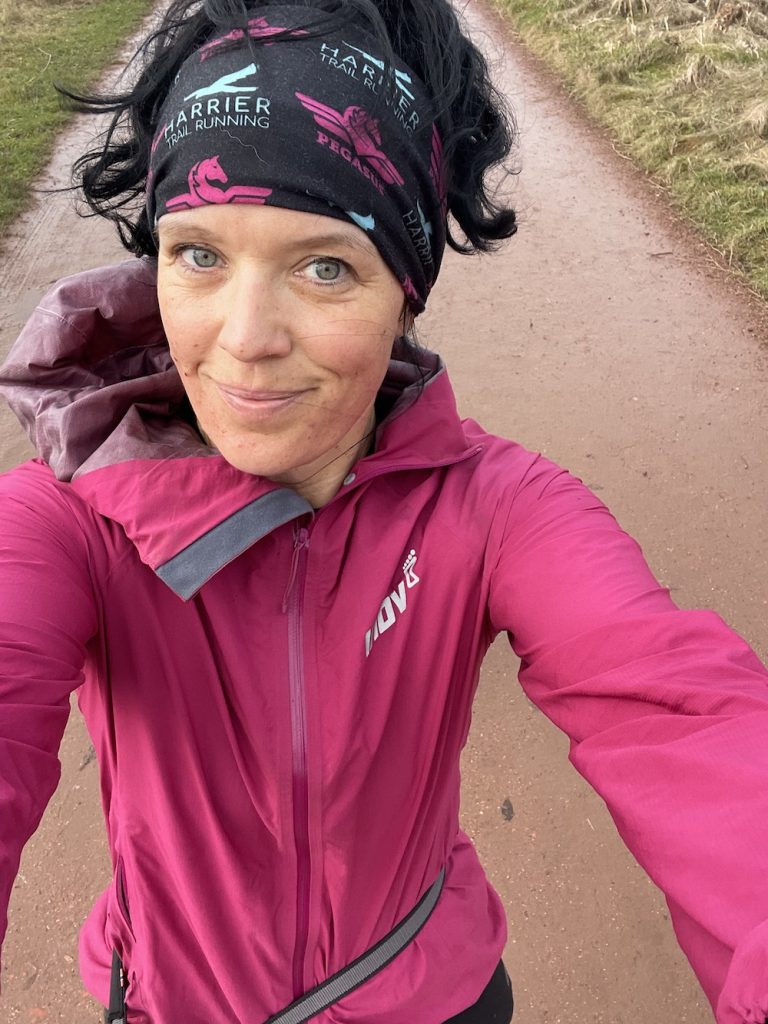
Photo courtesy Allie Bailey
I wasn’t thinking clearly at all. I had no emotions, and no sense of feeling. I didn’t feel pain the way normal people feel it, I didn’t feel anything. I was in an anhedonic state and lived in a grey fog. I lived it in forever, like 20-odd years. Nowadays it’s a lot harder because I’m very aware of what I feel.
When you are in touch with yourself and your emotions, you know you have a choice. When you are an addict, you don’t have a choice.
Similar question when it comes to personal admin on extreme ultras – you say you didn’t manage it well, but clearly it was well enough to complete successfully, and as a fully participating member of your team. How do you think you managed?
I didn’t really care. Personal admin didn’t come into it. As long as I had water, I was alright. Because I didn’t feel anything, I wasn’t really bothered. When you’re an addict, you stop looking after yourself. You look after everyone else, but not yourself. I wanted to die so looking after myself didn’t matter.
Even if you’re not a runner, when you get to that stage of addiction or depression, you stop looking after your personal admin. Now, when I go and do these events, or when I’m teaching, I want to make them as easy as humanly possible. I know they’re going to be hard, I know it’s going to hurt, so I’m like, make this as easy as possible for yourself, because I can’t take codeine or drink alcohol to make the pain go away.
I’m on the Spine Safety Team next week, and there’s no way I’d be able to do that if my personal admin isn’t on spec. If we’re told ‘get your bag, you’re going up the hill now’, you need to be ready to leave now. 10 years ago I’d have lost my first aid kit, or couldn’t find my water. I wouldn’t even mention I wasn’t ready and I would go without it.
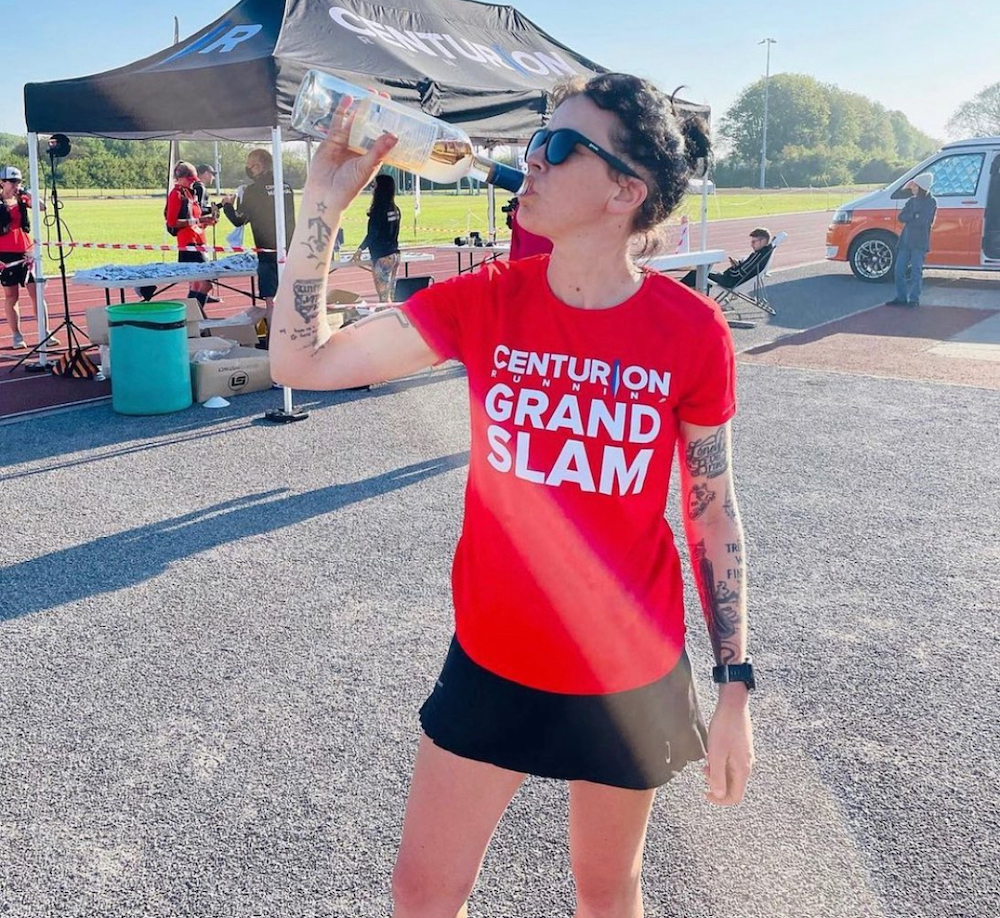
Photo courtesy Allie Bailey
The title of the book, There is No Wall, came from Allie being asked at the Running Show a few years ago how to avoid the Wall by someone running a half marathon. Allie had a lightbulb moment and told her there is no Wall. It’s a possible outcome made probable by scary marketing to ensure you buy their products, but an outcome that is avoidable. Allie realised she could apply the same mindset to her own circumstances; her situation wasn’t written in stone and she could change it.
What I like about this book is rawness of it. This is someone telling us frankly how shit the shit bits are, but also offers an insight into how to dig yourself out of it.
I went on to ask her how differently she thought her running is now to 10 years ago.
If you attach your worth to one thing, when that thing’s gone, you have a problem. So now I ask ‘am I getting enjoyment out of this’ and ‘why am I doing it’. I’m going back to the Arc of Attrition this year because I love it, I want to draw as much attention to their races as possible, it’s hard, my crew love it and we have the best time. There’s so many good reasons for me to do it.
I have dreams of stuff I want to do. I want to win a Centurion 100 race. One day I will win a Centurion 100 and have that big trophy. I will train, train really hard to do it, and hopefully no one faster than me will turn up on the day, but they might and so it will be on to the next year.
The other thing for me is, showing other people you don’t have to be super quick, super thin, super fit, super this, super that to run. You can do this just for the enjoyment of it. Being a “good runner” isn’t about being a “fast runner” or about winning stuff or being in the top ten of your age group. It’s about encouraging people, it’s about being an inspiration to your peer group, it’s about taking people out. It’s showing people you don’t have to have these pressures, you don’t have to do what these fucking magazines tell you to do, or buy the stuff that even the companies that sponsor me are telling you to buy.
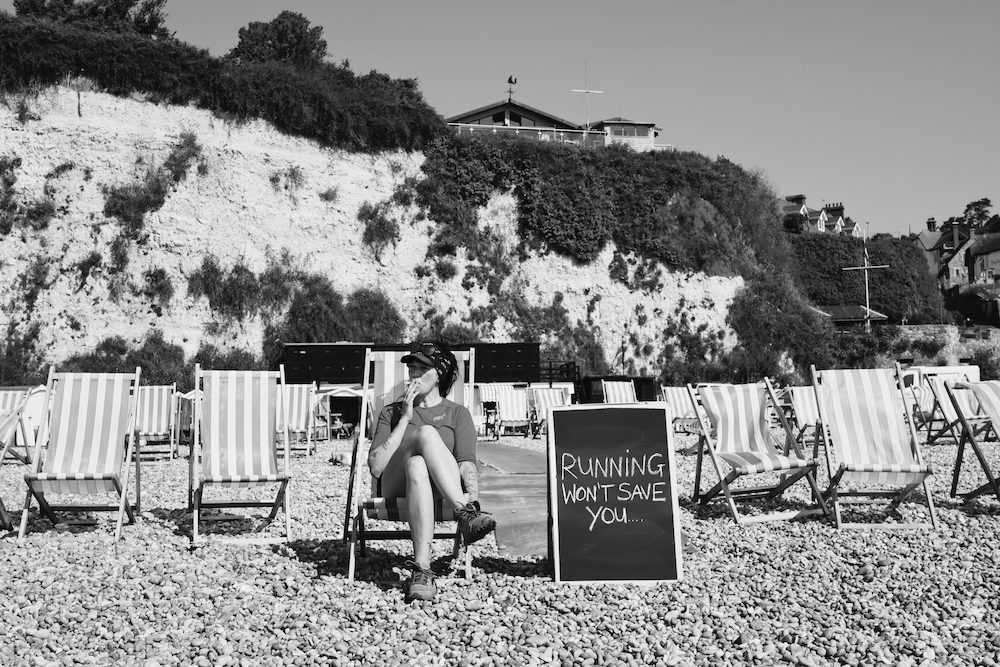
Photo courtesy David Miller
I asked Allie what she would do if she couldn’t run again; how much self worth does she place on it?
It’s not my whole life. No one thing is my whole life. I spent so long feeling like I don’t deserve to be here, that I’ve done a lot of work to step away from those things and stepped away from hanging my hat on a hook saying that’s where my worth lies. I don’t know how I’d feel if I was told I couldn’t run again; as humans we have this habit of predicting the future and saying ‘this is how I will feel’. I don’t do that anymore.
Her attitude is admirable and many would benefit from this mindset (including myself!).
Allie has shared much of her life on social media. I wanted to know what her relationship was with social media and what part has it played in her recovery?
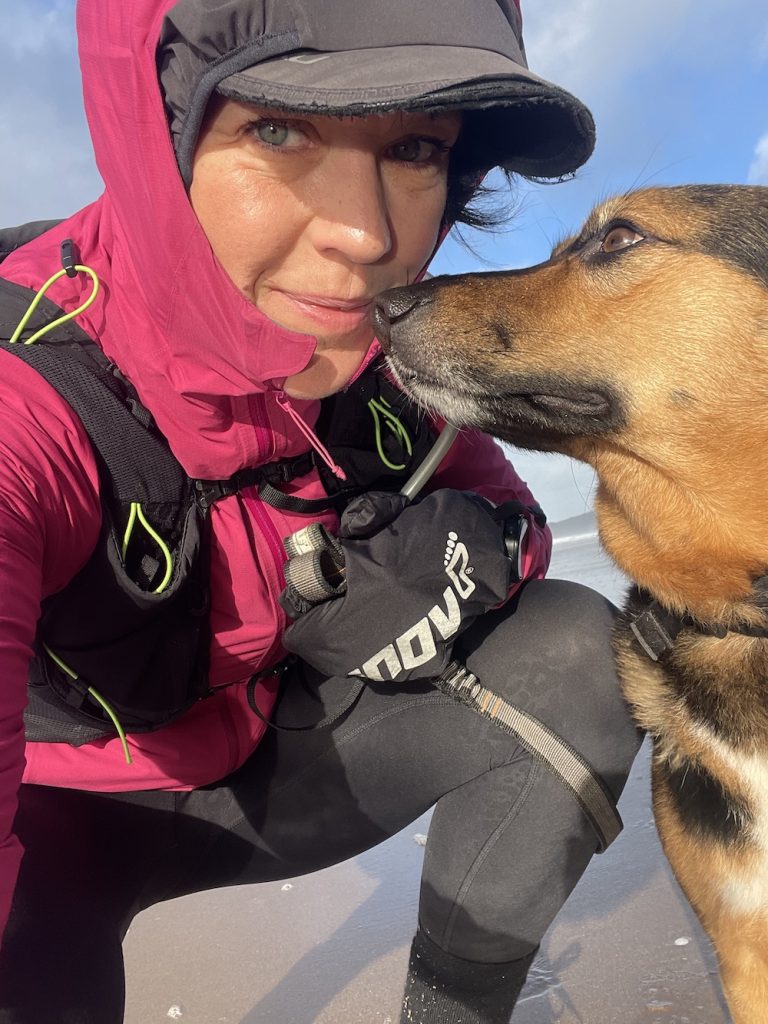
Allie with her dog Pickle. Photo courtesy Allie Bailey
I use it. I use it and it doesn’t use me. I don’t go and look at other people’s feeds. I only use Instagram. I talk to Renee McGregor about this a lot, because we both hate it, but we’re of the opinion that you have to be in the playground, if you’re going to have an opinion on bullies. I use it almost like a diary for myself. When I hit rock bottom and skidded face down into the concrete and wanted to die, I created the set of values that I wanted to live by, and I decided I was going to display these at all times. So I want to show people what is going on all of the time.
Mental health and addiction breed in the dark. When you put it in the light, when you’re honest, no one can get you. I’ve been quite scared about publishing this book. There’s a lot of stuff in there which is pretty fucking close to the bone. My behaviour in the past has been abhorrent but the shame of that can only breed if it’s kept a secret.
Another interesting facet to There is No Wall is the fact running didn’t actually save Allie. She says it enabled her; by doing the challenges and races she did, whilst being an alcoholic, actually allowed her to hide the fact she was an alcoholic.
It’s well known in the community that many ultra runners have or have had some mental problems (Allie would say all of us!).
Addicts are focused on their addiction. Ultra runners are focused on what they want to achieve.
People say “you’ve just swapped one addition for another”. I really push back against that. Running is not an addiction. When you’ve fought yourself in your head, fighting those voices saying you can’t do this, you become very aware those are just thoughts. You become better at handling them. And that’s what makes people who have gone through mental health issues good at this stuff.
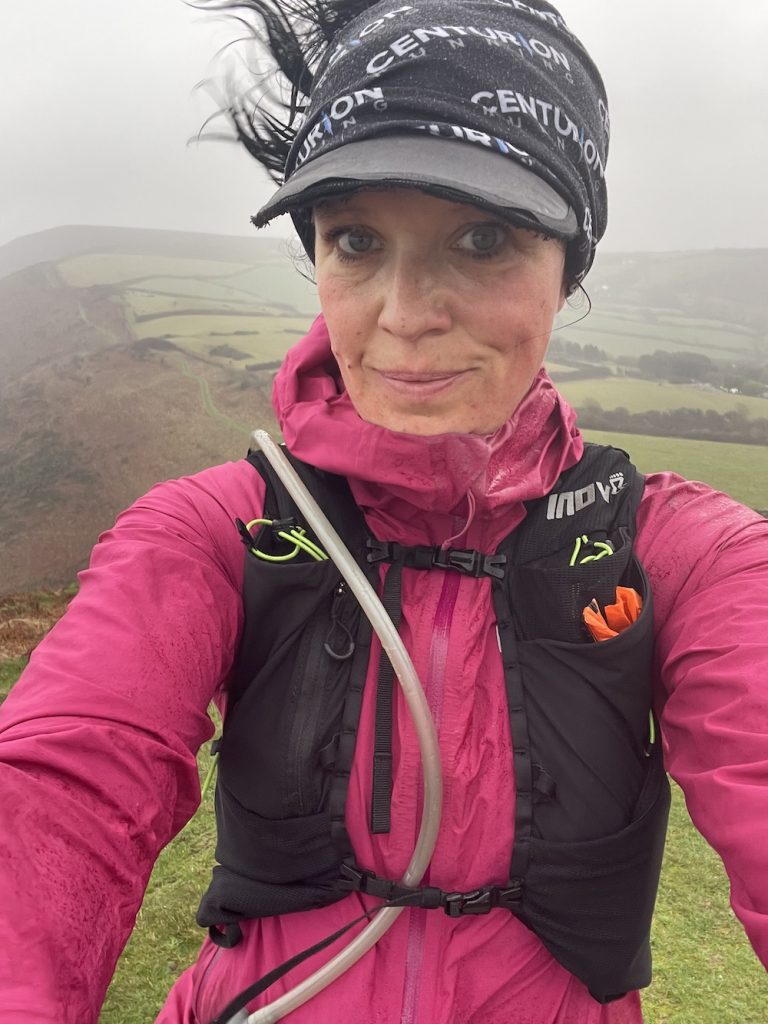
Photo courtesy Allie Bailey
My final question to Allie was for anyone realising their relationship with alcohol, or anything else, was unhealthy. Is there a way to cut off arriving at the rock bottom?
If you are asking yourself if you have a troubled relationship with alcohol, you have a troubled relationship with alcohol. There’s no shame in it; you’re addicted to something that’s highly addictive. It’s been pushed at you and it’s the only substance that you are questioned why you don’t do it. It’s a societal issue. There is nothing wrong with being addicted to alcohol. What there is something wrong with, is not doing something about it.
What I ask people who question themselves on this is, the next time you go to have a drink, ask yourself how is this going to serve me? How is it going to make your life better? Usually people respond with “it relaxes me” or “it makes me more funny”, “everyone’s doing it”. But those reasons are not good reasons to put a liquid into your body. Going to the pub and having a pint of orange juice is the same as going to the pub and having a pint of alcohol except you’re just not poisoning yourself.
It’s about being honest with yourself. People don’t accept where they are, they accept where they want to be.
“While I was writing this book, people would obviously ask me what it was about. ‘Well,’ I’d say, ‘it’s about a depressed alcoholic who realises her dream job is killing her, gets super into running and then stumbles through life a miserable fucking wreck doing ridiculous things, running ridiculous races until her whole life falls apart”
Excerpt from There is No Wall
Pre-order from Vertebrate Publishing here. RunUltra members get 25% off all Vertebrate Publishing books – get the code here!
